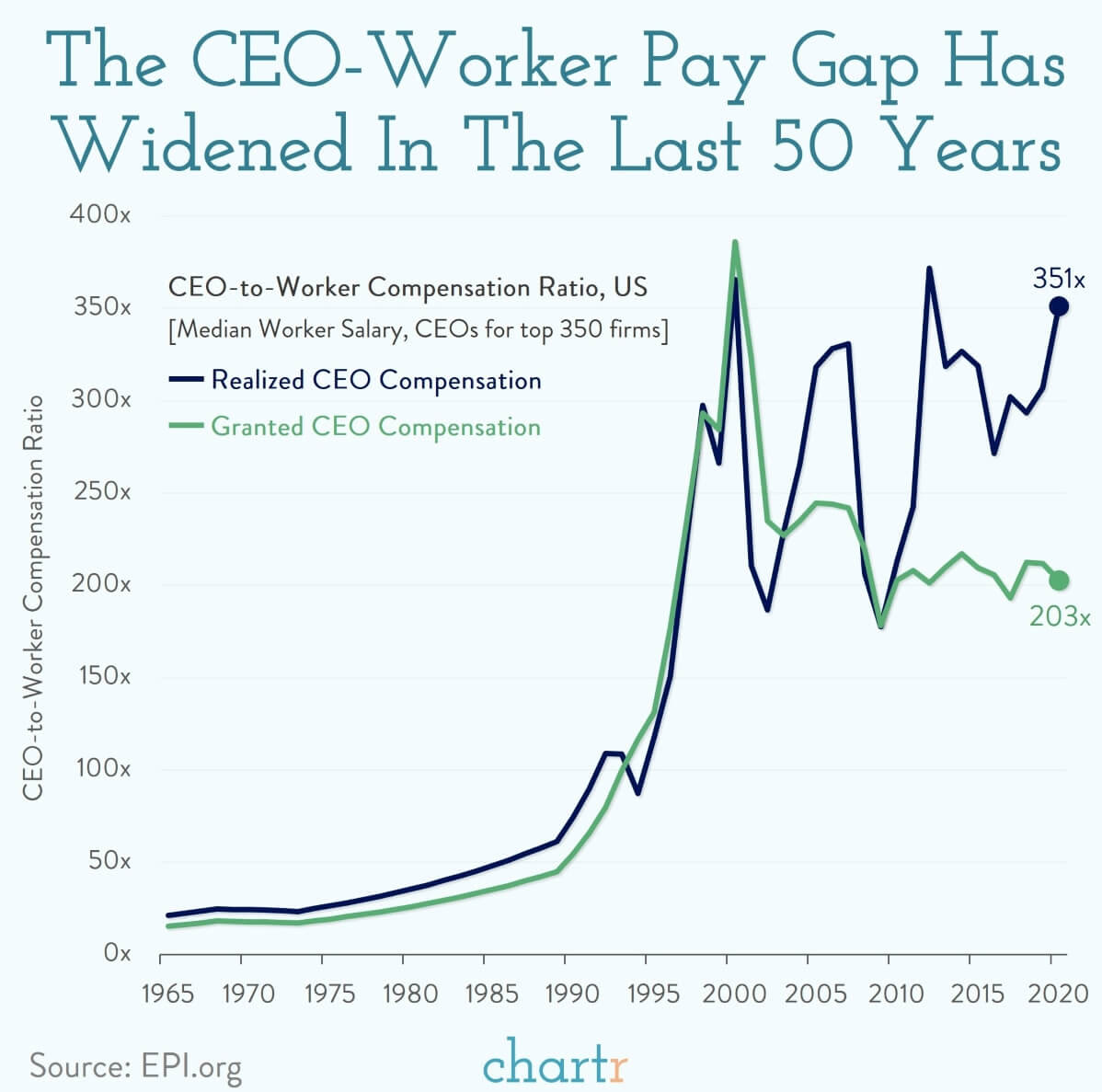Hi! We have 3 charts for you today:

The median pay package for the CEOs of America's largest public companies rose an inflation-busting 12% last year according to analysis of more than 400 companies from the Wall Street Journal, with a typical CEO making a crisp $14.7m — and 9 CEO's raking in packages worth more than $50m last year.
The data comes amidst a number of shareholder rebukes of CEO packages. Yesterday, JPMorgan shareholders voted against Jamie Dimon's pay, with only 31% supportive of a $50m one-off payment to the bank's CEO. That news followed a similar vote at Intel, where shareholders voted against a $178m payout to CEO Pat Gelsinger, and last week Amazon shareholders were also advised to vote against the packages of a number of top execs, including CEO Andy Jassy.
Elon Musk, who this week has been tweeting to complain about Twitter's fake users, is a notable exception on CEO pay, with Tesla reporting no pay to Musk again after awarding him a record 2018 package that was valued at $2.3 billion at the time. Warren Buffett is another exception on the list — he's kept his salary at $100k for the last 40 years.
The bigger picture
Aside from the big individual stories this week, the debate on CEO pay, and inequality more generally, is likely to intensify as inflation squeezes the cost of living for workers — who have seen a 3-4% real pay cut on average, once adjusted for inflation.

Indeed, this updated chart above, using data from the EPI shows how CEO compensation has outstripped that of typical workers over the last 50+ years.
From 1965-1970 the average CEO of a top company in the US earned 23x that of a typical worker. By 1990 that was 74x. In 2020 the average top CEO's actual, realized compensation was more than 350x that of a typical employee (the realized vs. granted difference is primarily down to stock market returns, as stock options and equity usually make up the majority of CEO compensation deals).

The future of work
Every week new tensions crop up at companies — big and small — all around the world over one key question: what's the right balance between fully in-office and fully at-home for employees?
I want to WFH (sometimes)
We've summarized the conclusions of a great survey from Gallup in the chart above, and the conclusions are pretty straightforward — most people want a little bit of both.
Pre-pandemic, just 8% of remote-capable jobs were actually done exclusively from home, a proportion that has jumped almost 5x, to 39%, as of February of this year.
But interestingly, most employees surveyed — 59% to be exact — would actually prefer a hybrid working arrangement, which is more than the 32% that would like to be exclusively remote, and way ahead of the 9% that would like to be fully on-site.
Go deeper: check out the Gallup study.
1) How is inflation impacting you personally? Depends on what you eat, drive and buy — this great interactive visualization from The NYTimes gives you a bit more of a personal perspective.
2)The Office's longevity is remarkable: this chart shows the relative search interest of popular TV series after the last episode air date. (Ouch, Game of Thrones).
3) MiamiCoin, a crypto project that hoped to raise funds for government projects, has lost ~90% of its value from its peak as the crypto crash continues.
4) Walmart has joined the list of companies that have had a rough quarter — yesterday the retailer's share price fell 11% after reporting difficulties due to inflation, a tight labor market and dramatically slower online sales growth (1% this year vs. 37% last year).
5) Data chaos be gone: 96% of companies surveyed by Flatfile have said they've run into problems with data onboarding. If your business is one of the 96%, try Flatfile's data onboarding platform.**
6) COVID-19 was ninth on the list of a survey of Americans biggest concerns. Inflation came top.
7) US traffic deaths have hit their highest level in 16-years, with 2021 deaths rising by 10% on the year prior.
**This is sponsored content.